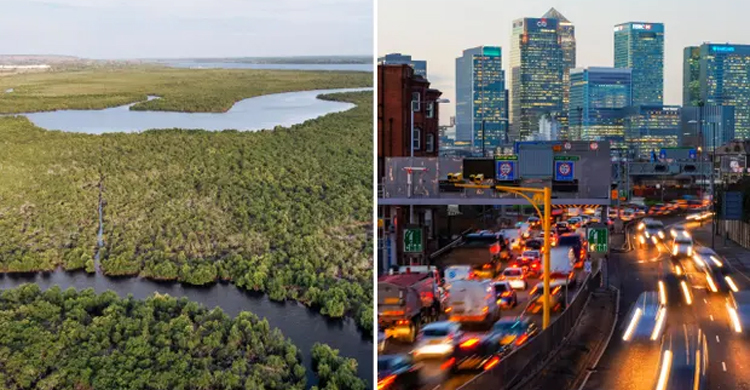West accused of ‘climate hypocrisy’ as emissions dwarf those of poor countries

In the first two days of January, the average Briton was already responsible for more carbon dioxide emissions than someone from the Democratic Republic of the Congo would produce in an entire year, according to analysis by the Center for Global Development (CGD).
The study, which highlights the “vast energy inequality” between rich and poor countries, found that each Briton produces 200 times the climate emissions of the average Congolese person, with people in the US producing 585 times as much. By the end of January, the carbon emitted by someone living in the UK will surpass the annual emissions of citizens of 30 low- and middle-income countries, it found.
Euan Ritchie, a policy analyst at CGD Europe, said his work was prompted by the “climate hypocrisy” of western countries, including the UK and the US, that have pledged to stop aid funding to fossil fuel projects in developing states.
“At Cop26 there was lots of hand-wringing by rich countries about the extent to which aid and other development finance should finance fossil fuels in poorer countries,” said Ritchie. “The hypocrisy of this caught my attention.”
“Our analysis shows that in just a few days, the average person in the UK produces more climate emissions than people in many low-income countries do in an entire year. It would be a cruel irony if the countries that have least contributed to this problem won’t be able to have access to energy infrastructure.”
Several countries, including some developing countries, and finance institutions have signed up to a pledge to end public support for international fossil fuel projects. The same countries will be able to continue to develop fossil fuels at home. The US has at least 24 pending fossil fuel projects representing more than 1.6 gigatons of potential greenhouse gas emissions, while the UK is licensing new oil and gas fields in the North Sea.
The CGD research used World Bank data of per capita carbon emissions for each country, spread out over a year, to calculate the point at which a British or US citizen’s energy use surpassed that of someone living in a low- or middle-income country. About 940 million people, mainly in sub-Saharan Africa, do not have access to electricity.
African leaders, including President Muhammadu Buhari of Nigeria, who has committed Nigeria to net zero by 2060, and Lazarus Chakwera, the president of Malawi, have spoken out about their countries’ need to transition to net zero via natural gas.
The Energy for Growth Hub, an international research network, estimates that if 48 countries in Africa, excluding South Africa and several north African nations, tripled their electricity consumption through use of natural gas, the resulting carbon emissions would be less than 1% of the global total.
Vijaya Ramachandran, the director for energy and development at the Breakthrough Institute in Berkeley, California, argues that blanket bans on fossil fuel projects in poor countries are “colonial” and will entrench poverty while doing little to reduce the world’s carbon emissions.
“It’s very easy for rich countries to impose fossil fuel financing bans on poor countries, while at the same time increasing their own consumption of fossil fuels,” she said. “It’s rank hypocrisy and it’s devastating for poor countries as they need a wide range of energy to fuel development.
“It’s well known renewable energy is intermittent and needs to be backed up by other sources. Telling African countries they just need solar is completely hypocritical and colonial.”
Rose M Mutiso, the research director of Energy for Growth Hub, said the CGD research should be used to inform the debate over responsibility for the climate crisis.
“Solving the climate crisis in the medium term is the responsibility of high emitting countries, not only because they caused the problem but logically, it’s where high emissions are concentrated,” said Mutiso, who is Kenyan.
“The video gaming industry in California is using more energy than entire African countries,” she said. “There’s this idea that in California we can’t live without video games, or air conditioning, but we are worried about Africans moving up and consuming. It’s really important for us as Africans to establish that our development is non-negotiable. All of those decades of exploitation and being left behind – that is owed to us.”
Mutiso cited a 2019 study that estimated electricity demand from gaming in California alone would grow from 5 terawatt hours (TWh) in 2011 to as much as 11TWh by 2021, the same as Sri Lanka’s entire consumption.
Source: The Guardian



